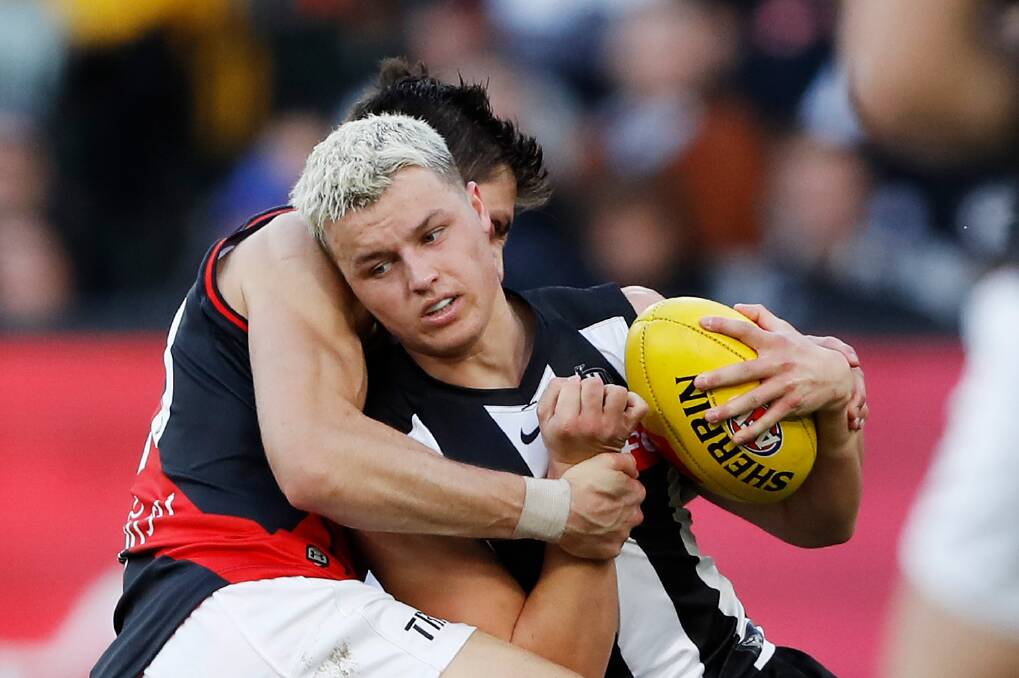
In terms of its place in the national sporting landscape, AFL football is a very big fish in a still relatively small pond.
So intense is the media and consequent public focus on every aspect of the game, and so many competing public platforms are there all trying to attract attention to their particular take, that we're making mountains out of molehills a lot more than we used to.
Take, for example, the ongoing soap opera concerning Collingwood youngster Jack Ginnivan and his penchant of playing for head high free kicks by lowering his body when taking possession.
Ginnivan isn't the first player to use this tactic, he won't be the last, and he isn't even the only player doing it currently.
But, in my view, the whole issue is being portrayed as a much bigger deal than it really is.
The latest episode concerns an obviously too-high tackle applied to Ginnivan by Essendon's Mason Redman last Sunday, which wasn't paid as a free kick.
Given the previous month or so of continued discussion, we had another round of debate. As a result, the AFL moved to issue a statement in which it conceded that a free should have been paid, but noting also that Ginnivan had contributed to the contact.
This follows an earlier AFL statement in which it "clarified" its pre-season change of interpretation around head-high tackles, something which went largely unremarked upon at the time last January purely because it was out of season.
That's not the AFL's fault.
But it did make a mistake buying into the debate with a public statement which was always going to be dramatised by the usual media suspects as a change, or a new development when it was simply a re-statement of the rule.
All the AFL really had to say was, "please refer to what we said in January, and maybe pay attention next time".
Too often, I fear that honest attempts to do the right thing by those running the game are now manipulated by the various "content drivers" into a "controversy" entirely of their own creation.
That reactivity is usually well-intended, and ironically, a consequence of the league over the years fielding accusations of being too aloof and not communicating enough with its fan base.
That communication comes, by necessity, through media channels. But are they now a reliable indicator of what the actual supporters of the game are concerned about? I have my doubts.
Too often, I fear that honest attempts to do the right thing by those running the game are now manipulated by the various "content drivers" into a "controversy" entirely of their own creation.
Which is what I feared might also happen in the aftermath of the other tedious discussion out of last weekend's round, concerning the draw between Richmond and Fremantle.
We were allowed to digest what is still a rare result in the context of 200-odd games per season for fully five minutes before the now inevitable cries of "play extra time" began again, accompanied by social media fan polls.
The problem with these sorts of pushes is that unless someone takes the trouble to bite back with a counter-argument, they eventually win the day. So here goes.
To the claims that draws are a lot of trouble for no result, a draw IS a result, one which awards each team two match points, which go towards their qualification process for a finals series. That could help or hinder either the Tigers or Dockers in exactly the same way a win or loss could.
It adds another layer to an AFL ladder which this season is tighter than ever, with just two games separating the top seven teams and the five jousting for eighth spot now on three different match point totals.
The argument that draws leave everyone flat are rubbish. You don't go from the intense excitement and tension of the conclusion to that Richmond-Fremantle game to anti-climax in an instant just because scores were level. Indeed, the aftermath of the game was full of animated discussion about the errors of Tigers Noah Balta and Noah Cumberland and the reliving of those moments.
Neither does the argument there should be uniformity between playing conditions in home and away games and finals stack up. They were already different types of games before the introduction of extra time for finals in 1991, one set played for match points, the other without. And both types of games have survived just fine side by side for 30 years now.
This recurring yawn is pushed by the same people who either have a vested professional interest (ie. work in television) and can't see past milking the drama for as long as possible, or whom can't seem to cope with any competitive situation in which there isn't a designated winner and loser.
It's another consequence of the age of instant gratification. And the desperate yearning for content about a game which, as great as it is, only has so much of interest to offer. How about we all try to maintain a little more perspective on it?





